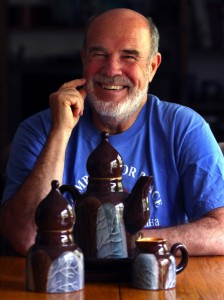Santa Rosa’s Ukrainian Connection

When Fred Ptucha started trying to connect Santa Rosans with citizens of the Ukrainian city Cherkasy, he had no idea just how deep the connection would become.
In the 22 years since he forged a sister city relationship between the two, 20 weddings have taken place. Ptucha enjoys watching the romances blossom but, he said, the first was the most delightful.
Ptucha and Rick Duval, both Viet Nam vets, were on a trip to Russian co-sponsored by Vets for Peace, Viet Nam Vets of California and the Sister City program. On the last night of the trip, they were approached by a woman in her 30s who looked like Brigitte Bardot, with reddish-blonde hair and pouty lips.
“She and Rick were six feet apart when they saw each other. I could feel the electricity,” Ptucha said. “She came to see us off and (Rick) laid a big wet one on her. He got so involved in that kiss, I had to yell for him to jump aboard after the boat was six feet from the dock.
“He said to me, ‘Fred, you’ve got to find her and tell her to come to Santa Rosa.’”
When Ptucha next returned to Cherkasy on sister city business, he wasn’t sure how he was going to find the woman. But on the last day of the trip, he saw her walking down the street and got the chance to deliver Duval’s message.
“She pulled back her hair and there was a piece of string around her neck,” Ptucha remembers. “At the end was a key. She said, ‘Give this to Rick. It’s the key to my heart.’
“I still get goose bumps when I remember that moment. I stood up for them at their wedding.”
Another match that delights Ptucha is the 43 year-old California woman who married a 20 year-old Ukrainian student.
Santa Rosan Andrea Carroll Skrypka met her husband without Ptucha’s help while working in the Ukraine. Her grandmother was from the Ternopil region of Ukraine, and when she visited Cherkasy with the sister city program in 1990, she was touched by the plight of Ukrainian children with diabetics.
She formed the Ukrainian Diabetes Project to find donors of Ukrainian descent and to provide information and education about the disease. Her group has helped nearly 3,000 children and provided $2.2 million worth of supplies.
While working on the project, she met an engineer acting as an Ukrainian interpreter. They were married and now live in Santa Rosa.
Although Ptucha was born and raised in Northern California, his parents came from Russia. As an outspoken Russian-American, he was often contacted by people seeking his help.
In 1989, a group called that was trying to establish the Cherkasy sister city relationship. He describes them as “Sebastopol peace folks” who had started the process but were told by Sister Cities International that their town was too small to pair with Cherkasy.
The city has 300,000 residents, sits in a lowland area on the bank of the Dnipro River, is surrounded by a pine forest and has a mild climate. It’s the province’s cultural, political and educational center. Santa Rosa seemed like a much closer fit.
Ptucha says that at first he declined, saying it was bad timing. A few hours later, the Press Democrat called to say a reporter was being sent to the Soviet Union and wanted help preparing for the time. Then his parents called to report that a cousin was now living in the Cherkasy area.
The coincidences were enough to convince him to change his mind, he said, and over the next two years he worked to overcome some big obstacles.
“Ronald Reagan was president, and he called Russia ‘the heart of the evil empire,’” Ptucha said. “But Mikhail Gorbachev had launched glasnost (openness and increased personal freedom) and perestroika (political reform). They were counterweights against the militarism of the Regan administration.
“Gorbachev made people-to-people things like this possible.”
The grass roots initiative first gained momentum in 1956 with President Eisenhower’s White House conference on citizen diplomacy. Tens of thousands of Americans pledged their support to create a free and peaceful world.
Ptucha still points to President Dwight D. Eisenhower’s speech during that conference as a way to sum up Sister Cities’ primary goal of fostering peace and communication between countries. Eisenhower said, “I think that people want peace so much that one of these days government had better get out of their way and let them have it.”
In the years since Ptucha’s effort succeeded:
* More than 400 people from Santa Rosa and 300 from Cherkasy have exchanged visits;
* The group has been awarded $50,000 by the U.S. Department of State to reduce domestic violence in Cherkasy. Police chiefs and domestic violence professionals have participated in exchanges;
* Spin-off organizations have been created from the ties, including Skyrpka’s Ukrainian Diabetes Project, the Ukrainian American Women’s Action Program and Climbers for Peace.
Not one to stand on his laurels, Ptucha has several more goals for the program.
He hopes those interested in climbing will join him and other members of Climbers for Peace. The group brings together people from cultures around the world to climb together in the spirit of “friendship, good will and cooperation.”
The group’s eighth expedition will take them to southern Russia to climb 18,510-foot-tall Elbrus, the highest mountain in Europe, and in the summer of 2013 they will travel to Slovakia.
Most of all, Ptucha would like the city council to honor its commitment to the Cherkasy sister city program.
“I’d like some elected official to go, this year or as soon as possible, to visit Cherkasy. We’ve not had an elected official go for 22 years. Meanwhile, at least 15 or 20 elected officials have visited our sister city in Korea.”

